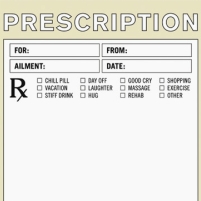Supreme Court Hears Case Involving Use of Doctor Prescription Records by Drug Companies
Tuesday, April 26, 2011
 (graphic: knockknock.biz)
(graphic: knockknock.biz)
Should the government be allowed to shield the records of doctors who write prescriptions for patients? This is the matter before the U.S. Supreme Court today, regarding the constitutionality of a Vermont law designed to keep physician-prescription information out of the hands of pharmaceutical company marketers.
Studying the prescription histories of doctors has become an important tool of drug salespeople because it gives them insight into the audience they’re pitching.
“It’s very powerful data and it’s easy to understand why drug companies want it,” Dr. Norman Ward, a family physician in Burlington, Vermont, told The New York Times. “If they know the prescribing patterns of physicians, it could be very powerful information in trying to sway their behavior—like, why are you prescribing a lot of my competitor’s drug and not mine?”
In addition to Maine and New Hampshire, Vermont was one of the first states to pass a law limiting the use of a doctor’s prescription records for marketing purposes. Data firms that sell this information, along with pharmaceutical companies, challenged the Vermont statute, losing in district court before an appeals court ruled in their favor. The Supreme Court will now decide in Sorrell v. IMS Health if the law violates the free speech protections of the First Amendment.
The restrictions in the Vermont law only apply to sharing prescription data for marketing purposes. The use of the information by law enforcement, medical researchers and even insurance companies is not restricted. In addition, it allows doctors to opt into allowing their prescription details to be given to drug companies.
Those supporting the Vermont restriction on revealing prescription data consist of the federal government, the attorneys general of 35 states, the AARP, professional medical associations, privacy groups and the New England Journal of Medicine.
Opponents of the law include the National Association of Chain Drugstores, the Association of National Advertisers and news organizations including Bloomberg and the Associated Press.
-David Wallechinsky
A Fight Over How Drugs Are Pitched (by Natasha Singer, New York Times)
Argument Preview: How Broad is the Right to Mine Data? (by Lyle Denniston, SCOTUS Blog)
Sorrell v. IMS Health Inc. (SCOTUS Blog)
- Top Stories
- Unusual News
- Where is the Money Going?
- Controversies
- U.S. and the World
- Appointments and Resignations
- Latest News
- Can Biden Murder Trump and Get Away With it?
- Electoral Advice for the Democratic and Republican Parties
- U.S. Ambassador to Greece: Who is George Tsunis?
- Henry Kissinger: A Pre-Obituary
- U.S. Ambassador to Belize: Who is Michelle Kwan?






Comments